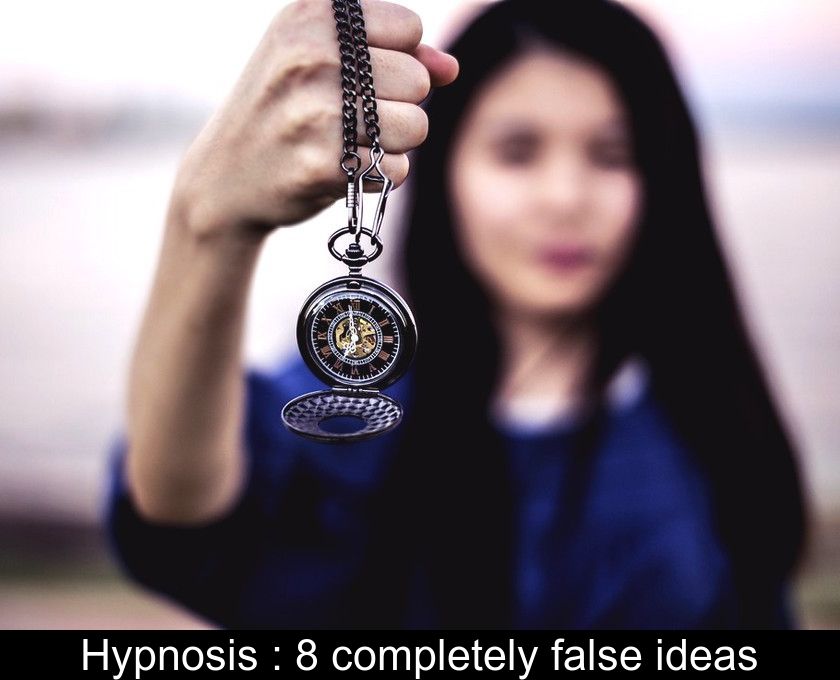Hypnosis : 8 Completely False Ideas
There are many reasons and health problems that can lead you to consult a hypnotherapist. Medical hypnosis can be used to treat addictions, phobias, stress and many associated symptoms such as insomnia, hot flashes or irritable bowel syndrome. However, many people have preconceived ideas about this method and are reluctant to start. To sort out the truth from the false, we have listed 8 preconceived ideas about hypnosis.
1- Under hypnosis, you can make me do anything
Many people are afraid to consult a hypnotherapist because they have seen shows where hypnotists make the audience do crazy things...
But medical hypnosis has nothing to do with show hypnosis. When you see a hypnotherapist, you don't have to worry about them making you do anything.
During the session, this specialist will use your imagination to help you relax and find a path to recovery.
However, if the images or metaphors you are asked to imagine seem inappropriate or uncomfortable, you will be perfectly fine to refuse to do so.
2- Under hypnosis, you are no longer yourself
One of the most common misconceptions about hypnosis is the fear of losing control completely.
It is true that this method just like meditation allows you to reach an altered state of consciousness located on the border between waking and sleeping. But this does not mean that someone else will take control of your mind.
The suggestions and exercises offered by the therapist will simply allow you to tap into resources that you have but cannot mobilize in an ordinary waking state.
This method will thus help you to detach yourself from the conditioning anchored in your brain, to modify your perceptions and to project yourself into a future where you get better.
3- You risk getting stuck in a state of hypnosis
Another common misconception about hypnosis is the fear of staying in that particular state of consciousness and not being able to return to it at the end of the session.
This preconceived notion is completely false: at the end of the session, as in a classic relaxation session, you will gradually return to an awake state.
You will then be able to move, stretch, yawn and open your eyes to return to reality. When you wake up, you will remember everything that was said, unless you fell asleep during the session (which is not the intent).
To be noted: only people who suffer from depression, schizophrenia or bipolarity should consult a psychiatrist before trying medical hypnosis to prevent any risk of psychotic decompensation.
4- Some people cannot be hypnotized
One of the most common misconceptions about hypnosis is that some people cannot be hypnotized.
In theory, anyone can enter this state of consciousness on the borderline between wakefulness and sleep because it is a state that our brain naturally experiences whenever we are about to fall asleep.
It is true that patients are all different and are more or less receptive to this method. It is estimated that 10% of individuals have difficulty letting go and that conversely 10% of people enter the hypnotic trance easily.
For all the others, it is more or less easy to enter this state depending on the moment and the therapist.
5- All hypnotherapists are the same
Contrary to what one might think, the effectiveness of medical hypnosis also depends on the person who practices it. The idea that one could consult any hypnotherapist and obtain the same results is false.
As a general rule, it is recommended to see a health professional trained in hypnosis. This is because he or she will be able to rule out any risk of underlying illness before offering you a session.
Moreover, it should be stressed that hypnosis does not cure physical disorders and should never be used as an alternative to medication. It simply complements other treatments to help patients with stress, chronic pain, sleep disorders or phobias.
6- This method is not really scientific
One of the common misconceptions about hypnosis is that it has no scientific basis. But in reality, thanks to MRIs, researchers now have scientific evidence for the effectiveness of medical hypnosis.
They have been able to observe that hypnotic trance alters the activity of certain areas of the brain, including areas related to emotions and the transmission of painful messages.
This finding explains why regular sessions help to reduce the perception of pain and the emotional component of chronic pain (especially the fear of hurting again).
The effectiveness of this method is now recognized in hospitals. It is proposed as a complement to treatments in pain centers and in the management of certain problems such as migraines, osteoarthritis, multiple sclerosis or phantom limb pain after amputation.
7- Hypnosis is useless in cases of serious illness
Even if hypnosis does not directly cure serious diseases such as cancer or multiple sclerosis, it can be used as a complementary therapy to better support treatments.
The compilation of several studies conducted on more than 1350 patients has shown that in cases of breast cancer this alternative medicine helps to reduce pain and anxiety during treatment.
It helps to better manage fear and pain during biopsy, reduce fatigue during radiation therapy as well as anxiety during surgery.
8- It works every time to lose weight or stop smoking
On the other hand, hypnosis is sometimes presented as a miracle method to stop smoking or to lose weight. But beware, if you decide to consult a hypnotherapist to please your loved ones, there is no chance that this method will work.
If you want hypnosis to help you quit smoking or lose weight, these goals must be your own. You must really want to change your habits and be motivated for the sessions to help you change your relationship with cigarettes or food.
The hypnotherapist's suggestions only strengthen your own will to lose weight or stop smoking, but they will never replace your own efforts.
Also, if you want to solve a specific problem, it is better to go to a hypnotherapist than to try self-hypnosis alone at home.
Consulting a specialist allows you to set up personalized sessions and exercises that you can repeat at home to increase your chances of success.








